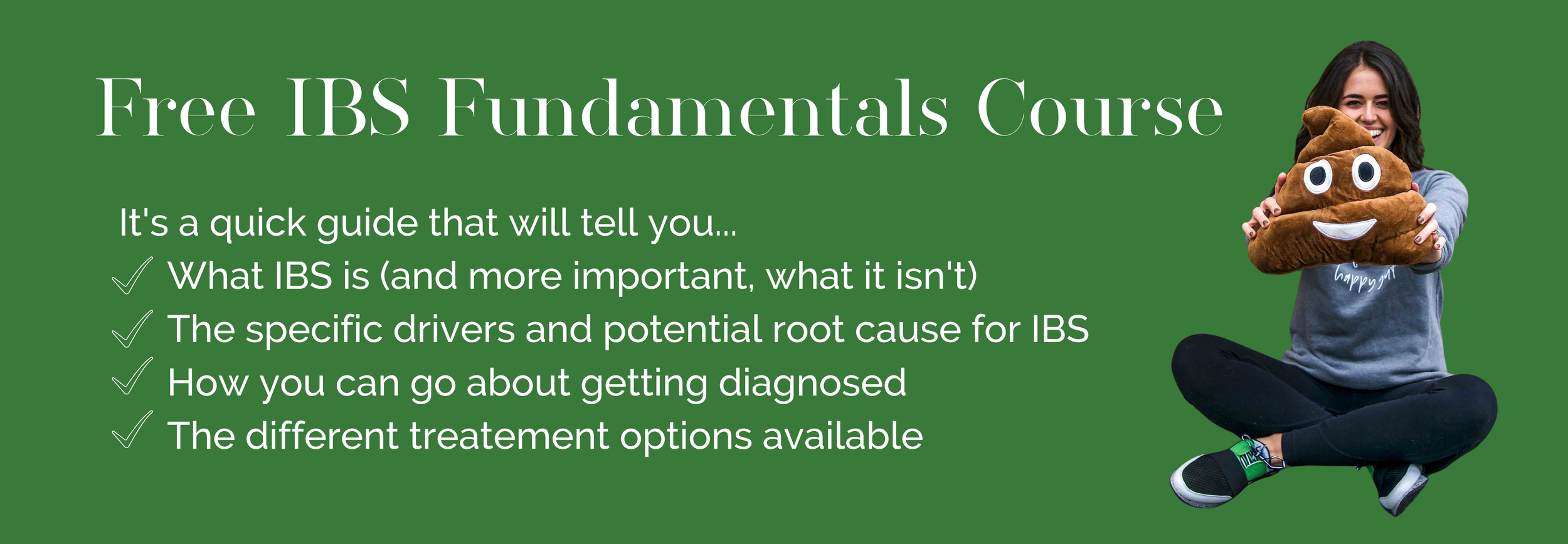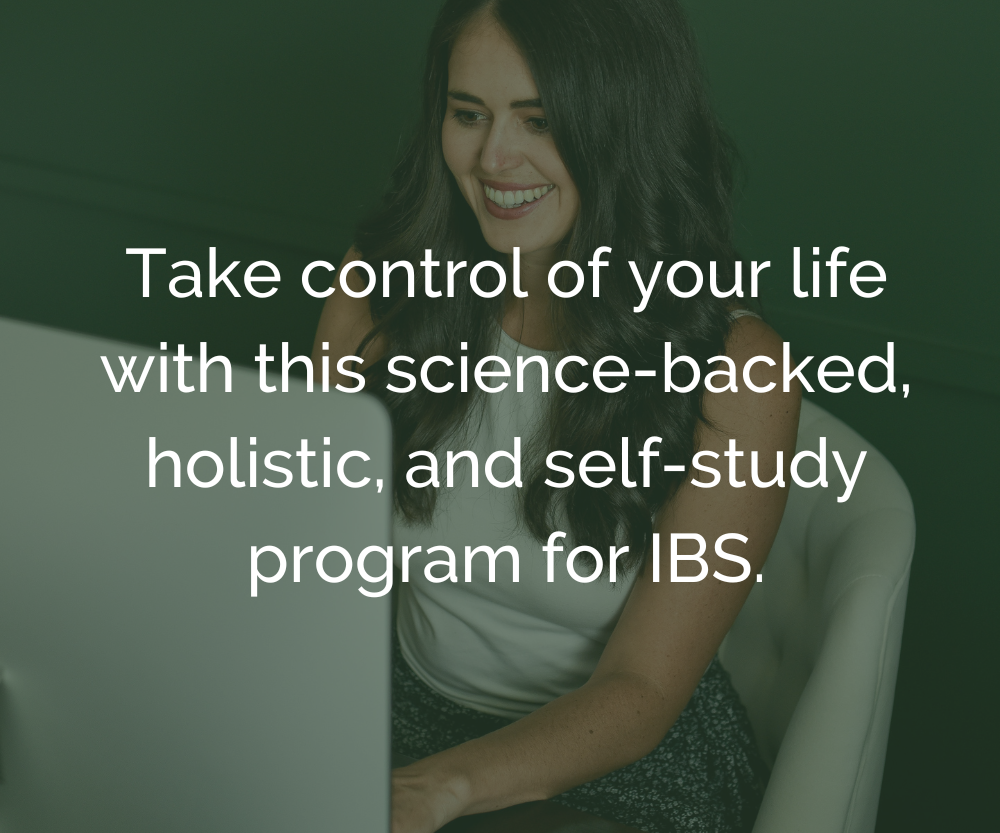The Effect of the Keto Diet on IBS and Digestion
The ketogenic (keto) diet is one of the most popular diets in our world these days. Before we get into the role keto may play in IBS and digestion, I want to lay the foundation about what keto actually is and what research says about it.
The keto diet isn’t actually new, but has been around for while, used a medical nutrition approach for epilepsy and seizures. It was designed to be applied in a clinical setting with both a dietitian and a doctor. It was never intended to be long term, but did show success in the treatment of these conditions.
Keto hit the wellness world with the growth of low carbohydrate diets, including South Beach, Atkins, and Dukan. It is marketed as a quick way to lose weight, and has left the clinical setting to be recommended by influencers, personal trainers, and nutrition gurus. The difference of keto versus many other low carb diets is that the focus is on an increase of fats, a decrease of carbs, and a moderate amount of protein.
The keto diet is coupled with intermittent fasting, and low carb fasting (less than 50 g/day). This causes the liver to produce ketones from fat to be used for energy. Normally, our body’s ideal energy source is glucose, which comes from carbs. Utilizing ketones, instead of glucose, is referred to as ketosis.
What are the pros of the keto diet?
The keto diet isn’t completely useless or a total fad. It does show some positive effects in research. Studies show that the keto diet can aid in weight loss, stabilize blood sugars in the short term, and have a positive effect on mood, memory, and cognitive ability. These studies all shown a short term benefit. There is currently no studies showing a long term benefit.
What’s your poop personality? Find out here!
What are the cons of the keto diet?
The major con to the keto diet is how restrictive it is. Consuming very low amounts of carbohydrates can limit adequate intake of vitamins, minerals, and fiber which all play a role in the health of the body and gut microbiome. Another con to the diet is that many people either lead themselves through it, or follow their favorite influencer’s advice. Without the supervision of a dietitian and doctor, the concern is that an individual may be putting themselves at risk for heart disease or other health conditions due to food choices and balance of nutrients. Every individual has a unique metabolism and nutrition needs, so the diet may not be appropriate or effective for everyone.
We also don’t know much about the long term effects of the diet. We know there are some benefits for specific populations in the short term, but the diet may not be a sustainable or appropriate lifestyle.
Even in the short term, the keto diet is not recommended for those who are pregnant, breastfeeding, have a history of eating disorders, those with Type 1 diabetes, or those diagnosed with kidney, pancreatic, or liver disease.
What about the keto diet for IBS?
There is an increased interest in using a low carb diet, like a keto diet, for IBS and digestive health. One small study shows a positive effect from using a very low carbohydrate diet (VLCD) in those with IBS-D. Symptoms improved, but the study was small and done over a short duration of time.
Other studies actually show a decrease in microbial (the makeup of bacteria in the gut) diversity with the keto diet. This is problematic because dysbiosis of the microbiome (poor diversity) is thought to be a major factor in the onset and progression of IBS. We also know that a diverse microbiome is an indicator of long term health, including reduced inflammation and a reduced risk for many metabolic and autoimmune conditions.
We also know that high fat meals and prolonged periods of fasting can actually lead to IBS symptoms due to slowing gut motility and increasing risk for FODMAP stacking and large meals outside of the fasting period.
What to do instead
Many of the benefits seen from a keto diet (when done correctly) come from a consistent intake of healthy fats. While high fat meals can be problematic for those with IBS, a moderate intake of healthy fat throughout the day is possible and beneficial.
Healthy fats improve the health of our brains, help stabilize blood sugars, and contribute to the feeling of satisfaction after a meal, which helps increase relationship with food and pleasure from meals. Healthy fats come from plants and fish, and some of those sources are high FODMAP, including avocado and large portions of nuts and seeds.
Low FODMAP healthy fat sources include peanuts/peanut butter, sunflower seeds/sunbutter, olives and olive oil, and fatty fish. Small portions of some nuts and seeds can be tolerated, as well as 1/8 avocado. Refer to the Monash University FODMAP Diet app for specific portion sizes.
Instead of restricting carbohydrates with a keto diet, it may be more beneficial to modify intake of resistant starches, fiber, and FODMAPs (fermentable oligosaccharides, disaccharides, monosaccharides, and polyols), per your tolerance. This would be more sustainable and decrease the risk for poor microbial diversity long term.
There are actually more studies to support the use of the low FODMAP diet approach for those with IBS versus a very low carbohydrate diet. However, this approach can still be very restrictive, so it’s best to work through it with a dietitian to ensure you’re meeting your nutrition needs, not over restricting foods, and increasing your beneficial gut bacteria.
If you want to learn more about the low FODMAP diet, check out our 1-on-1 services for a more personalized approach through the diet and other interventions for IBS.
Sources:
https://www.sciencedirect.com/science/article/pii/S0920121111002117
https://www.sciencedirect.com/science/article/abs/pii/S0197458010004392
https://www.ncbi.nlm.nih.gov/pubmed/11918434
https://academic.oup.com/ajcn/article/93/4/836/4597739
https://www.ncbi.nlm.nih.gov/pubmed/14525681
https://www.ncbi.nlm.nih.gov/pmc/articles/PMC1373635/
https://www.ncbi.nlm.nih.gov/pubmed/9417152/
https://www.ncbi.nlm.nih.gov/pmc/articles/PMC6413021/
Are you frustrated with your IBS symptoms? Do you desire to be confident in your food choices? Do you want to have a healthier relationship with your body and diet? Are you ready to take control of your IBS?



